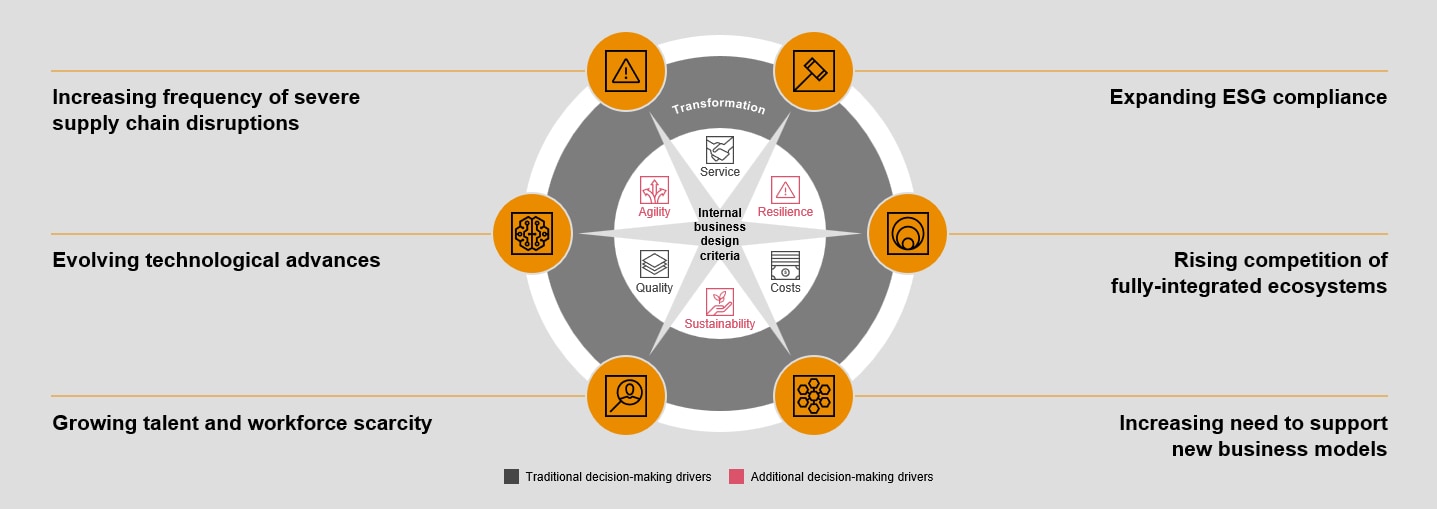Recent times have not been kind to supply chains. After making it through the extreme upheaval unleashed by the COVID-19 pandemic, supply chains have found themselves face to face with even more uncertainty. Be it geopolitical conflict, workforce scarcity, rising sustainability demands, or relentless technological change, supply chain disruptions are coming from all fronts and seem to be here to stay.

Overview of disruptive trends confronting supply chains
PwC: Reinventing Supply chains 2030, 2024
To understand how organizations are dealing with these disruptive trends, PwC recently interviewed more than 1,000 senior supply chain executives across six major industries. According to the respondents, industry leaders expect disruption to intensify as the decade continues. Many are also overhauling their supply chains in response – but not all companies are transforming at the same pace.
A growing gap
To meet the continuous challenges, industry-leading enterprises worldwide are reinventing supply chains from end- to-end and investing in modern cloud-based platforms to help them gain better data visibility and improve supply chain decision making. Many companies, on the other hand, remain in the early stages of transformation. Based on their level of supply chain maturity, we have grouped surveyed companies into four categories:
Champions have reinvented supply chains to be adaptable, sustainable and cognitive by broadly implementing capabilities and technologies to master disruptive trends.
Innovators are mid transformation, implementing advanced capabilities and applying selected technology use cases in an integrated fashion. They are on track to be future leaders.
Followers are in the early stages of transformation. They have applied selected capabilities and new technologies, and have disruptive trends on their radar.
Novices recognize disruption and acknowledge compliance challenges. While they may have taken some action in some areas of their supply chains, they haven't developed broader strategies.
There is real value to be gained by rising to meet disruption head-on. Champions who have largely implemented priority capabilities and technologies, including supply chain visibility and enhanced supply chain planning and decision-making, expect revenue gains of 16% and supply chain cost reductions of 19%.
On the other hand, organizations who fail to make such investments will fall behind the curve – risking operational disruption, commercial losses, damage to partner and customer relationships, and missed opportunities in the process.
With so much at stake, how can companies bridge the divide and build more flexible, efficient, and resilient supply chains?
Shaping smarter supply chain planning
At PwC, our approach to digitizing supply chains integrates leading-edge technologies with reimagined operations. With Oracle as the enabling technology, we focus on helping organizations develop three transformative capabilities:
- Establishing a single, unified view of cross-functional data
- Forecasting supply, demand, and performance with advanced analytics
- Driving agile decision-making with automation and artificial intelligence (AI)
Let’s take a closer look at how each of these enables smarter supply chain operations.
The first step in a solid digitization strategy is getting data into good shape. Only then can it be easily shared and leveraged for analysis and decision-making. With consistent digital data, organizations can capture real-time information on demand, inventory and supply, co-ordinate with different functions, and more easily adapt to changing conditions.
Imagine, for example, that there’s been a delay on an ocean freight shipment. With integrated digital data, the logistics team can flag this to the planning and fulfilment teams, who can then understand how this delay impacts delivery timeframes and customer orders, and take appropriate actions to mitigate the impact.
With data centralized and readily accessible, organizations can set the stage for advanced analytics, including planning optimization, predictive analysis, and simulations. It allows supply chain planners to run multiple scenarios with dynamic, rather than fixed, parameters and calculate the impact of every scenario on both individual links and the supply chain as a whole.
Finally, when organizations have strong digital fundamentals in place, they can go a step further and harness the power of automation and AI, which are game changers. By taking advantage of generative AI, for example, companies can look at the outcomes of scenario analysis and make recommendations for actions to take and their likely outcomes. With AI handling more of the heavy lifting here, scenario planners are free to focus on more strategic decision-making.
Tech-enabled transformation
By drawing on Oracle’s best-of-breed technologies, PwC empowers supply chain organizations to digitise their operations and drive measurable performance improvements. We offer holistic supply chain solutions utilising Oracle Fusion Cloud Applications, emerging technologies, and our unique tools and accelerators.
We help clients make the most of classic and generative AI embedded in Oracle Fusion Cloud Applications, including AI-powered demand sensing developed specifically for supply chain planning. This analyzes historical sales data, pricing changes, seasonal trends, and significant events such as holidays or weather fluctuations. By deciphering these patterns, companies can maintain optimal inventory levels – reducing inventory carrying costs and ensuring that end-customers enjoy ready access to the products they need.
PwC and Oracle are delivering cloud-powered innovation for companies across a range of industries. For one global provider of cancer diagnostics solutions, we developed an end-to-end Oracle Fusion Cloud solution that’s transformed internal workflows and supply chain operations. Using Oracle Fusion Cloud Supply Chain & Manufacturing (SCM), the company centralized solution data and customer information to gain more accurate and timely insight into global operations. Oracle SCM is also enhancing sales forecasting, resulting in a better balance between supply and demand, reduced inventory levels, and faster shipments to pathology laboratories.
At PwC, we are ready to help businesses unlock the true value of digital technologies, so they can chart a course through supply chain disruption and gain competitive advantage in an ever-changing world. If you’d like to learn more about how we can help you transform supply chain planning using Oracle solutions, please get in touch.
















